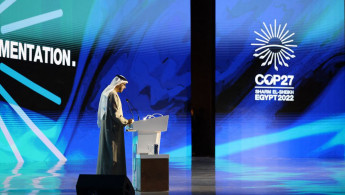COP28 host UAE using PR firms, lobby groups, to improve climate reputation
The United Arab Emirates has hired public relations and lobbying agencies to raise its international reputation as the host of next year’s UN climate conference before this year’s event, COP27 in Egypt, had even begun, according to The Guardian.
The UAE will host COP28 in November 2023.
Abu Dhabi’s move has exceeded efforts by other host nations of the climate conference, and suggests the Gulf state was highly involved in this year’s edition in Egypt.
"more than 600 fossil fuel lobbyists were registered for COP27 up 25%. UAE, the petrostate that will host COP28, had the most of any country — 70 official delegates." Seriously!? How can COP legitimacy survive this? Its morphed into an energy summit! https://t.co/vSvPj2n9KL pic.twitter.com/VYSkJtlPph
— Adam Tooze (@adam_tooze) November 14, 2022
PR firm FleishmanHillard composed letters proposing that Emirati ministers should attend climate conferences, most of which contained the phrase “the UAE is hosting Cop28 next year and will be involved with Cop27 in Sharm el-Sheikh”, The Guardian said.
The British newspaper also reported that the lobbying firm Akin Gump Strauss Hauer & Feld had contacted Democrat and Republican lawmakers in the United States alerting them that the UAE would host COP28 days after it was announced.
The UAE’s efforts to raise its environmental reputation highlights its desire to be viewed as a state leading the effort on climate change despite being a major oil producer.
Over 1,000 delegates from the Gulf state were at COP27 and this was by far the largest country delegation. They included representatives from public relations, artificial intelligence and real estate companies.
70 were reportedly linked to oil and gas companies, including Sultan Ahmed Al Jaber - the head of the state-owned Abu Dhabi National Oil Company as well as the UAE’s climate envoy.
Last month, Al Jaber said that oil remained a cornerstone of the global energy supply, but added that the UAE was attempting to lower emissions and increase production from renewable or less-polluting sources.
Fossil fuels are the largest contributor to climate change, and account for 75 percent of the world's greenhouse gas emissions, according to the UN.
COP26 last year ended with a pledge to keep global warming at 1.5 degrees Celsius over pre-industrial levels - a goal the world is set to miss over the next few years based on current emission trends.





 Follow the Middle East's top stories in English at The New Arab on Google News
Follow the Middle East's top stories in English at The New Arab on Google News


